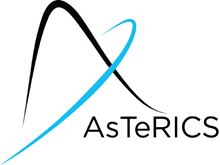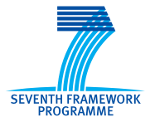AsTeRICS

Assisitve Technology Rapid Integration and Construction Set
The EU-funded project AsTeRICS
will investigate flexible and affordable construction sets for realising user driven Assistive Technologies by
combining emerging sensor techniques like Brain-Computer Interfaces and computer vision with basic actuators.
More than 2,6 million people in Europe have problems with their upper limbs and therefore many of
them depend on Assistive Technologies (AT). As the potential of the individual user is very specific,
adaptive, ICT-based solutions are needed to let this population group participate in modern society. Such
solutions are rarely available on the market.
AsTeRICS will provide a flexible and affordable construction set for realising user driven AT by
combining emerging sensor techniques like Brain-Computer Interfaces and computer vision with basic
actuators. People with reduced motor capabilities will get a flexible and adaptable technology at hand
which enables them to access the Human-Machine-Interfaces (HMI) at the standard desktop but in
particular also of embedded systems like mobile phones or smart home devices. AsTeRICS will
implement a set of building blocks for the realisation of AT:
- Sensors which allow the individual to exploit any controllable body or mind activity for interacting with HMI
- Actuators for interfacing to standard IT, to embedded systems and to interact with the environment
- An Embedded Computing Platform that can be configured to combine sensors and actuators to tailored AT-solutions which support the full potential of an individual user
The core of the software suite will be provided as Open Source. The complete system will be affordable
for many people who cannot benefit from leading edge supportive tools today.
AsTeRICS revolutionises the concept of AT: AT today mostly focuses on a certain task or situation.
Due to the growing importance of the PC, AT has been oriented towards standard Human-Computer
(HCI) or desktop interfaces. AsTeRICS respects the strong need for flexible, adaptable AT functionalities
accompanying people with disabilities away from the desktop, enabling them to interact with a divers and
fast changing set of deeply embedded devices in our modern environment.
The project parnters are:
- Kompetenznetzwerk Informationstechnologie zur Förderung der Integration von Menschen mit Behinderungen (KI-I), Austria (project leader)
- Harpo Sp. z o.o., Poland
- Sensory Software Ltd, United Kingdom
- CEDO, spol. s r.o., Czech Republic
- Research Group Embedded Systems - University of Applied Sciences Technikum Wien, Austria
- Starlab Barcelona SL STARLAB, Spain
- Université Pierre et Marie Curie (Paris 6), UPMC France
- Fundacion Instituto Gerontologico Matia - ingema, Spain
- University of Cyprus UCY, Cyprus
The AsTeRICS project is funded by 7th framework programme of the European Commission.
The duration of the Project is from Jan. 2010 to Dec. 2012.

